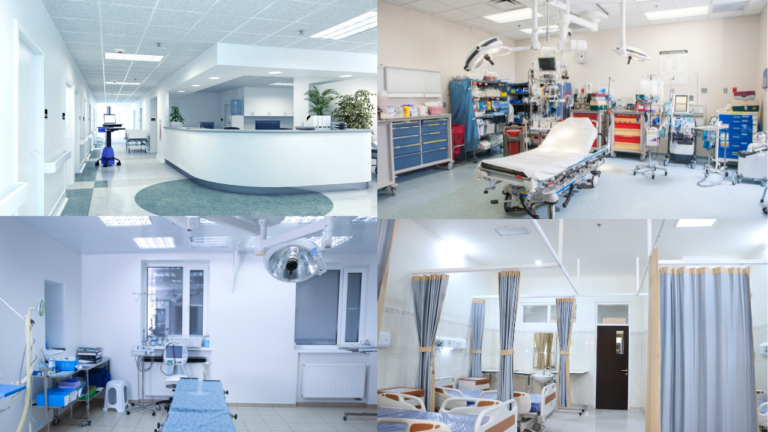HVAC Design and Implementation for Modern Healthcare Facilities
Modern healthcare facilities demand the highest infrastructure, hygiene, and comfort standards. The HVAC (Heating, Ventilation, and Air Conditioning) system is among the critical components supporting these standards. A well-designed HVAC system ensures a healthy indoor environment and plays a vital role in infection control, energy efficiency, and operational excellence.
At Alviz Electro India Pvt. Ltd., we understand the unique challenges of healthcare environments and offer tailored HVAC solutions that prioritize safety, precision, and sustainability.

The Role of HVAC Systems in Healthcare Facilities
HVAC systems in healthcare settings are not just about maintaining comfortable temperatures. They are instrumental in:
- Maintaining indoor air quality (IAQ).
- Supporting infection control protocols.
- Regulating humidity and temperature to support patient recovery and equipment performance.
- Ensuring 24/7 operation with fail-safe backup systems.
From multi-speciality hospitals to small diagnostic centres, the design and implementation of HVAC must be approached with utmost care and technical accuracy.
Key Requirements for Healthcare HVAC Systems
1. Indoor Air Quality (IAQ)
Healthcare spaces require advanced air filtration to remove pathogens, allergens, and airborne pollutants. Incorporating HEPA filters, UVGI systems, and multi-stage filtration ensures clean and sterile airflow in sensitive zones.
2. Infection Control
HVAC design must support the creation of positive and negative pressure zones. For instance:
- Positive pressure rooms (like OTs) push air out to prevent contamination.
- Negative pressure rooms (like isolation wards) draw air in to contain infectious agents.
3. Temperature & Humidity Control
Precise control over temperature and humidity helps:
- Maintain patient comfort.
- Preserve the integrity of medical equipment and medicines.
- Reduce bacterial growth in critical zones.
4. Compliance with Healthcare Standards
Systems must align with international and national guidelines, like:
- ASHRAE 170
- NABH (National Accreditation Board for Hospitals)
- CDC ventilation recommendations
5. Redundancy & Reliability
Uninterrupted HVAC operation is non-negotiable in ICUs, operating theatres, and laboratories. Backup units and power support must be included in the system design.
Zoning for Healthcare HVAC Design
Healthcare buildings are divided into zones based on criticality, each with its specific HVAC requirements:
- Critical Zones: Operating rooms, ICUs, sterile processing areas.
- Require HEPA filters, temperature control, humidity control, and pressure management.
- Semi-critical Zones: Patient recovery rooms, imaging centres.
- Require clean air circulation and precise climate control.
- Non-critical Zones: Lobbies, waiting areas, administrative offices.
- Focus on comfort cooling and basic ventilation.
This zoning helps optimize HVAC design and operation for both performance and cost-efficiency.
Design Considerations for Modern Healthcare HVAC
Energy Efficiency
- Integration of VRF/VRV systems, chilled water plants, and energy recovery ventilators (ERVs) can significantly reduce energy consumption.
- Smart HVAC systems adapt to real-time needs, reducing wastage and improving operational ROI.
Smart Building Integration
- HVAC systems should be integrated with Building Management Systems (BMS) for:
- Real-time monitoring.
- Automated fault detection.
- Predictive maintenance alerts.
Noise Control
- Use of low-noise fans, vibration isolation, and acoustic insulation ensures a quiet and calm healing environment.
Scalability
- Systems should be designed for future expansion, making them adaptable to increased patient loads or building upgrades.
Best Practices for Implementation
Site Analysis
- Assess local climate, space availability, and the facility’s functional layout before selecting an HVAC model or layout.
Material Selection
- Use antimicrobial ductwork, corrosion-resistant components, and medical-grade air filters.
Professional Installation
- Engage certified technicians to install equipment as per the design layout, ensuring minimal leaks and maximum efficiency.
Testing & Commissioning
- Perform thorough commissioning post-installation to check:
- Airflow rate.
- Temperature consistency.
- Pressure differentials.
- Filter performance.
Lifecycle Management & Maintenance
- Routine Inspections: Monthly or quarterly checks for filters, duct cleanliness, fan motors, and sensors.
- Energy Audits: Scheduled energy assessments help identify areas of inefficiency and recommend upgrades.
- Contingency Plans: Create emergency protocols for HVAC failure, especially in high-dependency units.
Why Choose Alviz Electro India Pvt. Ltd. for Healthcare HVAC?
At Alviz Electro India Pvt. Ltd., we offer:
- Tailored Solutions: Each healthcare project is unique. Our HVAC designs are customized based on facility size, function, and compliance needs.
- Complete Support: From consultation and CAD design to installation and AMC, we cover the entire project lifecycle.
- Quality Assurance: We work with top global brands and adhere to the highest quality and safety standards.
- Sustainability Focus: Our systems are designed to lower carbon footprint without compromising performance.
Conclusion
A robust and efficient HVAC system is critical to maintaining a safe, comfortable, and compliant healthcare environment. Whether it’s a hospital, clinic, or diagnostic lab, your HVAC design must balance air quality, temperature control, infection prevention, and energy efficiency.
Partner with Alviz Electro India Pvt. Ltd. to design and implement HVAC systems that meet the most demanding healthcare challenges while ensuring comfort, reliability, and peace of mind.
Disclaimer:
The blog posts on alviz.in are for informational purposes only. While we aim for accuracy, the content may not reflect the latest updates or specific advice. Alviz Electro India Pvt. Ltd. is not responsible for actions taken based on this information. For expert guidance, please contact us.